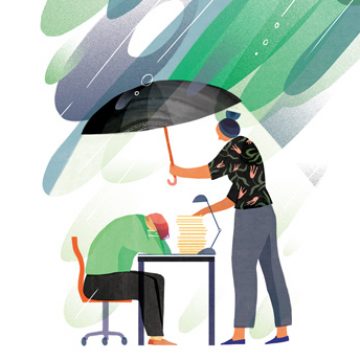
Michael Bryant
Executive director,
Canadian Civil Liberties Association
Drinking and the law can feel inseparable. According to a U.S. study, conducted in 2015, one-third of lawyers are problem drinkers — nearly five times the rate of the general population. There’s no clear diagnostic test that establishes how much is too much, but, in general, women should consume no more than eight drinks per week and men no more than 15. So if you see a colleague exceeding that limit, how do you bring it up?
“Don’t play Dr. Judge and tell people they’re drinking too much,” says Michael Bryant. “Try, ‘Your drinking means you’re not ever present after the sun goes down,’ or ‘I’m afraid when you’re out that something bad is going to happen.’”
Bryant should know. The former attorney general has been sober for the past 12 years, but he struggled with alcoholism for most of his adult life. Today, after practising as a criminal-defence lawyer for two years, he serves as the executive director of the Canadian Civil Liberties Association.
Most people seek help only after they see that drinking is the common variable in a slew of problems. “I think that’s the most useful test,” says Bryant. “If you’re having trouble in every area of your life and you’re telling yourself, ‘It’s the boss, it’s the spouse, it’s the world, it’s the election,’ maybe it’s not. Maybe it’s the drinking.”
If you do approach a colleague about his or her alcohol consumption, be prepared to damage that relationship for a period of time. “I had a colleague who, one day, told me he observed me drinking too much,” says Bryant. “He was right, and I was furious. But he helped me see the truth. Later on, I was able to thank him.”
 This story is part of the “How to Help” feature, from our Spring 2018 Issue.
This story is part of the “How to Help” feature, from our Spring 2018 Issue.
Illustrations by Wenting Li


